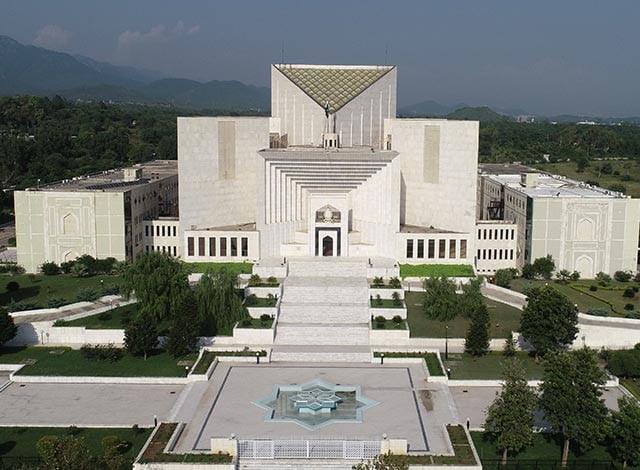ISLAMABAD:
While the Constitutional Court drags its feet to hear petitions challenging the 26th Constitutional Amendment, the Supreme Court has questioned the validity of the amendment, which prevents ordinary courts from exercising jurisdiction in cases involving the interpretation of law and the Constitution.
A three-judge bench headed by Justice Syed Mansoor Ali Shah issued a two-page written order stating that the petitioners argued that the present bench could not hear cases related to sub-section (2) of section 221-A of the Customs Act, 1969, as these challenge the constitutionality of a law.
Legal experts believe that the General Bench has effectively undertaken the task of examining the validity of the 26th Amendment. “The foundation of judicial review is based on this very premise,” noted one expert, citing Marbury v. Madison in the United States and Pir Sabir Shah in Pakistan.
The experts suggested that the bench may suspend the provision in the amendment that prevents regular benches from hearing certain cases.
Mirza Moiz Baig, a lawyer, emphasized that although Article 191-A of the Constitution, introduced through the 26th Amendment, limits the jurisdiction of ordinary benches, such “suspension clauses” are usually interpreted narrowly.
He explained that since Article 191-A removes the jurisdiction of the Supreme Court to hear certain cases and assigns such jurisdiction to special “constitutional” benches, the ordinary courts of the Supreme Court may well delineate the contours of Article 191-EN.
Similarly, while Article 191-A would suggest that questions relating to the validity of the 26th Amendment can only be decided by the ‘Constitutional Bench’ of the Supreme Court, one must not forget that such benches also owe their existence to the 26th Amendment.
Any assessment of the validity of the amendment by judges in the “Constitutional Court” may therefore give rise to concerns regarding legal soundness.
“Thus, a regular court determining the contours of Article 191-A may suggest that the Chief Justice constitutes a full court to determine whether the vires of Article 191-A is to be found and examine whether the provision violates the salient features of the Constitution.”
“This position is also crystallized in view of the fact that the Supreme Court has consistently held that a court seized of an issue can decide questions relating to its own jurisdiction,” Baig observed.
Earlier, Justice Mansoor Ali Shah had consistently urged the Chief Justice of Pakistan Yahya Afridi to prioritize petitions challenging the 26th Amendment.
Despite this, the petitions were not listed as the Chief Justice believed that the Constitutional Court should decide the fate of the amendment. However, Justice Shah disagreed, saying the Constitution does not prohibit the full court from examining the 26th Amendment.
However, the constitutional bench continues to adjourn the hearing of the petitions. It has also been under control over its composition, as judges on the Constitutional Bench are appointed by the executive. So far, the constitution bench has struggled to gain influence, although Justice Ayesha Malik, who is nominated to the constitution bench, is also part of the current permanent bench issuing the order.
Some lawyers believe that Judge Shah should refrain from making any decisions that could lead to his recusing himself from the entire 26th Amendment hearing. It is expected that the majority of the constitutional bench will agree that all judges must hear the case.
Meanwhile, a meeting of the All-Pakistan Lawyers Action Committee is scheduled today (Wednesday) to discuss a course of action aimed at reversing the 26th constitutional amendment.
Responding to the decision of the three-member regular bench, legal expert Hafiz Ahsaan Ahmad argued that under Clause 5 of Article 191-A of the Constitution, all petitions, appeals or revision applications against judgments or orders covered by Clause 2, whether it is pending or filed before the commencement of the 26th Amendment, should be transferred to the Constitutional Bench.
These cases shall be heard exclusively by Benches constituted under Article 175-A of the Constitution. He therefore argued that the customs case in question should have been transferred to the Constitutional Court.
Hafiz Ahsaan said the 26th amendment had redefined the SC’s jurisdiction by introducing changes in certain articles of the constitution. He pointed out that in light of this reinterpretation, no other body, in the presence of a constitutional court, can issue an order clarifying the jurisdiction of such cases.
This includes matters falling under clauses (a), (b) and (c) of Article 191-A of the Constitution. Therefore, he argued, the order passed by the three-judge bench on January 13, 2025 in the customs case – which requires jurisdictional interpretation – should not have been passed by a regular bench.
As this case involves the interpretation of Section 221-A of the Customs Act, 1969, it falls squarely within the jurisdiction clearly defined by the 26th Amendment and therefore ought to have been referred to the Constitutional Court.
Hafiz Ahsaan pointed out that this order is in violation of the provisions of Article 191-A, especially since several petitions challenging the validity of the 26th Amendment are already scheduled to be heard by the constitutional bench.
The president had previously transferred many cases back to the attorney general’s office because of similar jurisdictional concerns. He described this special order as a potential rewriting of the constitution, which in his view lacks legal sustainability.
Finally, Hafiz Ahsaan concluded that since Clause 5 of Article 191-A only designates the Constitutional Bench as the appropriate body to hear and decide such cases, the three-judge General Bench should have granted the request of the association’s counsel to transfer the case to the Constitution Bench for the necessary legal interpretation.



